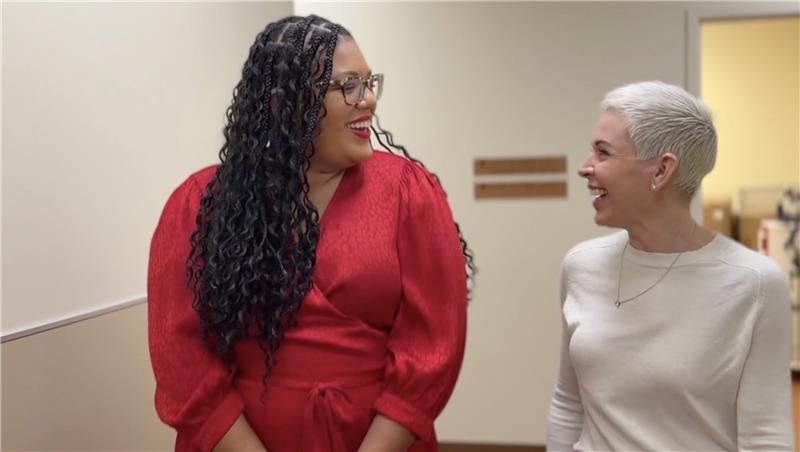TAMPA, Fla. — Breast cancer is the most common cancer in the United States, except skin cancer, according to the American Cancer Society.
It accounts for about 30% of new cancers in women each year.
As more young women are getting diagnosed, early detection is more crucial than ever.
WATCH: Tampa woman shares her journey with early-onset breast cancer
“I had a mammogram in December of 2019 because I had a lift after I had my baby and everything. So in 2019, my mammogram was completely clear,” said Marcelite Miller, who lives in Tampa.
She’s done frequent self-breast exams for most of her life.
“Because my dad actually had breast cancer in 1998,” said Miller.
So even after her 2019 mammogram found no issues, she still checked herself, and something felt off this time.
“I felt what I thought was scar tissue, but it felt different,” said Miller.
She immediately saw her doctor, who agreed. This led to another mammogram, an ultrasound and then a biopsy.
“When he took the biopsy out, the skin was very hard, and he said, 'yup it’s stage 2, possibly stage 3 breast cancer.' So in less than six months, I had a pretty aggressive-growing breast cancer,” said Miller.
That’s right— in less than 6 months after her clear mammogram, Miller was diagnosed with breast cancer in 2020 at the age of 40.

“My first thought was oh my gosh, I have a 6-year-old, and I’m not going to be here for her. Like that was my immediate thought. It wasn’t about me at all,” said Miller.
But five years later, after a double mastectomy, eight rounds of chemo, followed by 25 rounds of radiation, Miller is thankfully here, though she’s experienced some complications.
“I’m still on hormone therapy. I also get an injection every month here at Florida Cancer Specialists to keep me in menopause so I can stay on my hormone therapy. And I also get an injection every six months for my bone density… I did develop osteoporosis, so I will be on the injection every six months, and I also developed ulcerative colitis, so I’m on an infusion every eight weeks… Cancer really affects you in so many different ways, and people think when you’re done with a treatment, you’re done, and unfortunately, our bodies have these different ideas, and we’re not really done. We do get these side effects. Now I’ll get an infusion for ulcerative colitis for the rest of my life. At least it’s working. And that’s the important part,” said Miller.
Most women are over the age of 50 when they’re diagnosed with breast cancer.
However, there’s been an increase in early-onset breast cancer, like Miller’s.
That’s when you receive a breast cancer diagnosis between the ages of 18 and 45.
Tampa Bay 28 asked Dr. Robert Waide Weaver with Florida Cancer Specialists and Research Institute, about what’s behind this rise.

He said one reason is that there’s more awareness about getting mammograms and doing self-exams. Another reason is that there have been advancements in technology, medicine, and research in recent years, leading to more diagnoses.
“We’re learning a lot more about the genetic impact of breast cancer. Learning about new genetic mutations that can lead to breast cancer all the time. We’re learning to test for those in more and more patients than we ever have before, and that’s just part of the advancement of medicine,” said Weaver.
He and Miller are encouraging everyone to do regular self-exams.
Look for symptoms like:
- New lumps
- Changes in breast size or shape
- Nipple discharge
- Skin changes over the breast
- Pain or tenderness
The earlier cancer is found, the better your prognosis.
“I think it’s so important to do it all the time and anytime you feel something, just get it checked. It’s better to get it checked and be relieved that it’s nothing versus letting it grow and continue,” said Miller.
The worst thing you can do is not be proactive and ignore symptoms.
“I know it’s sometimes hard to face that something could be happening to you, but think about the relief if you get it checked. And even if you get diagnosed early, you get diagnosed early at an earlier stage. Like I wish that I was diagnosed at an earlier stage because it would’ve been an easy process,” said Miller.
“There definitely is that denial in patients that want to sweep it under the rug or feel that it will get better with time, but the regret is expensive. Regret is very expensive,” said Weaver.
Share Your Story with Larissa

Larissa Scott stays on top of everything education-related for Tampa Bay 28, but it’s not her only focus. From public health concerns to everyday expenses, Larissa is here for you. If you have a story you want to share, send her a message below.
.

Largo family loses home in morning fire, forced to start over
Mother and her nonverbal son with autism 20 escape safely as the home is condemned; community steps in to help with housing and recovery.





